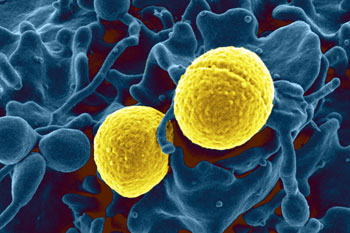(单词翻译:单击)
you are full of bugs.
你身上好多细菌!
No, not cockroaches and ants. These bugs are tiny, single-celled bacteria you can't see. They blanket your skin. They also fill your stomach, intestines, lungs and mouth.
它们既不是蟑螂也不是蚂蚁,这些小虫子很小,肉眼难见的单细胞细菌,它们不仅覆盖在你的皮肤上,而且也出没于你的胃、肠、肺口腔内。
In fact, roughly 100 trillion of these microscopic critters live in (and on) the human body. A typical person contains only about 37 trillion human cells. In other words, bacteria might outnumber human cells in an average person by roughly three to one.
事实上将近约100万亿此类微生物寄居在你的身体内外。一个人仅有37万亿人类细胞。换句话说,人类身体上的细菌远远超出了细胞数量以1:3的比例存在着。

Bacterial cells are very small. All of these bugs make up only between 1 and 3 percent of your body weight.
细菌细胞非常小。但是这些讨厌鬼足足占了你体重的1%到3%呢!
We even pick up bacteria from family members - for example, when someone kisses us on the cheek.
此外,这些细菌还会通过家人侵入我们的身体-例如,有人亲你脸蛋的时候。
You pick up some microbes from your mother during birth. As you grow, your body acquires more. For example, new microbes hop on when you play in the dirt or when a family member kisses your cheek.
分娩的时候妈妈便给宝宝留下了这些微小细菌,随着你长大,你身上的细菌会变得更多。比如说,当你在较脏的环境下玩耍的时候或者家人亲亲脸蛋时这些细菌都会趁虚而入。
At this point, you might be starting to wish you could get rid of all those germs. But that wouldn't be a very good idea. The microbes in your body are crucial to your health. They churn out nourishing vitamins. They help digest your food. Some even keep other, dangerous bacteria from multiplying so you don't get sick.
如此说来,你可能开始想要摆脱这些细菌。这种做法不太明智,因为这些细菌对你的健康还起着至关重要的作用,比如说他们会产出富含营养的维他命,帮助你消化食物,有的甚至还阻止其他危险细菌的繁殖来帮助你躲过感冒一劫。
In return, the bacteria get nutrients and a place to live. "It's a tit for tat," says Margaret McFall-Ngai. She is a microbiologist at the University of Wisconsin-Madison.
对于细菌而言,我们为其提供营养以及居所作为回报。美国威斯康星大学微生物学家Margaret McFall-Ngai无奈的感慨道:对于我们来说微生物细菌是一柄双刃剑!
译文属可可原创,仅供学习交流使用,未经许可请勿转载


